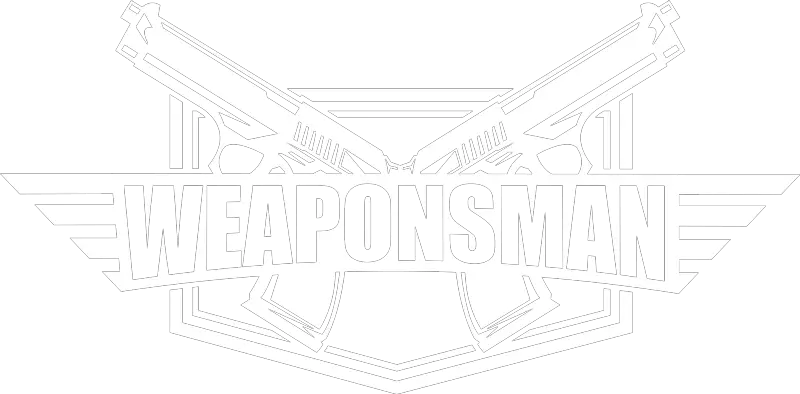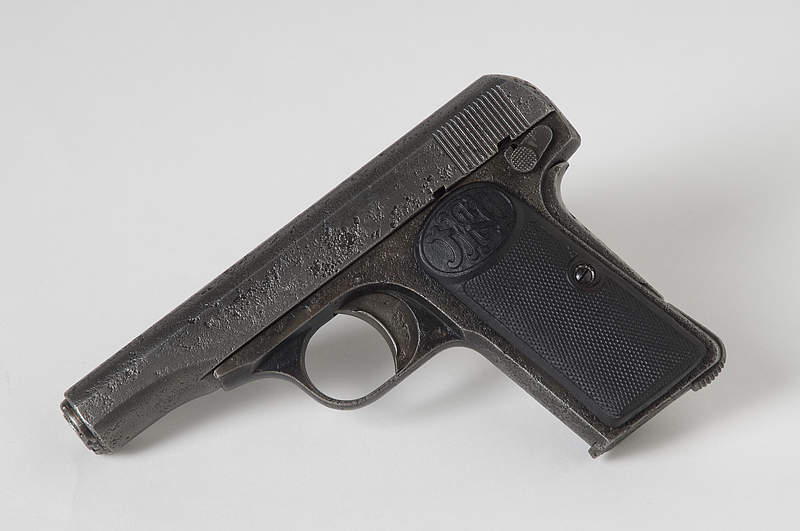His last words were, “It is nothing.” But he was terribly wrong.
Even as badly maintained and pitted as it is, this FN M1910 Browning in .380 ACP has the classic lines John M. Browning designed into it over a century ago. It’s still a not-bad choice for a backup or concealed carry pistol, although most of them are in the hands of collectors. Not many collectors would want one in as terrible and pitted condition as this one, but then, this is not just “one.” It’s “the” pistol that fired the shots that ended the Age of Kings, mortally wounding Archduke Franz Ferdinand of the Austro-Hungarian Habsburg Dual Monarchy and his wife Sophie. That assassination, by a Bosnian Serb pan-Slavic nationalist named Gavrilo Princip, led Austria to threaten Serbia (which had sponsored the assassination, providing this gun and other arms) with invasion. The Austrian threat produced a Russian counterthreat, a German counter-counterthreat, and Franco-British agreement to stand by their treaty obligations to Russia — if it came to that.
In the end, as we all know, it did come to that, to the detriment of nations and of generations.
Franz Ferdinand was an important figure. For one thing, the Emperor and King, Franz Josef, was old and unwell, and FF was his designated heir (he himself came to the position through tragedy, when the then-heir, his cousin Rudolf, committed suicide in 1889). From then, Franz Ferdinand was ready to take the reins. No one in the Habsburg court had thought out the fate of the monarchy beyond that, except that Franz Ferdinand’s and Sophie’s children were not eligible — their marriage was a love match between unequals, and so morganatic, a dynastic term meaning the kids’ blood was permanently attainted with the non-royalness of Sophie. It was only after the murder of FF and Sophie that Franz Josef began preparing Franz Ferdinand’s nephew Charles, who had been enjoying himself as an Army officer, for national leadership. They didn’t have long, as Franz Josef passed away in 1916, catapulting Charles onto the dual throne. All these consequences from a few pistol shots!
The murder is described in a book called Sarajevo, quoted at length in Wikipedia:
One bullet pierced Franz Ferdinand’s neck while the other pierced Sophie’s abdomen. … As the car was reversing (to go back to the Governor’s residence because the entourage thought the Imperial couple were unhurt) a thin streak of blood shot from the Archduke’s mouth onto Count Harrach’s right cheek (he was standing on the car’s running board). Harrach drew out a handkerchief to still the gushing blood. The Duchess, seeing this, called: “For Heaven’s sake! What happened to you?” and sank from her seat, her face falling between her husband’s knees.
Harrach and Potoriek … thought she had fainted … only her husband seemed to have an instinct for what was happening. Turning to his wife despite the bullet in his neck, Franz Ferdinand pleaded: “Sopherl! Sopherl! Sterbe nicht! Bleibe am Leben für unsere Kinder! – Sophie dear! Don’t die! Stay alive for our children!” Having said this, he seemed to sag down himself. His plumed hat … fell off; many of its green feathers were found all over the car floor. Count Harrach seized the Archduke by the uniform collar to hold him up. He asked “Leiden Eure Kaiserliche Hoheit sehr? – Is Your Imperial Highness suffering very badly?” “Es ist nichts. – It is nothing.” said the Archduke in a weak but audible voice. He seemed to be losing consciousness during his last few minutes, but, his voice growing steadily weaker, he repeated the phrase perhaps six or seven times more.
A rattle began to issue from his throat, which subsided as the car drew in front of the Konak bersibin (Town Hall). Despite several doctors’ efforts, the Archduke died shortly after being carried into the building while his beloved wife was almost certainly dead from internal bleeding before the motorcade reached the Konak.
It took about a month of cabled threats and ultimata, and then it was game on. Game would stay on for the next four-plus years, ending with Northern France and Belgium in ruins, Russia in an unholy revolution that brought forth a new Dark Age across Eurasia, Britain and Germany spent, with the cream of their youth interred in distant fields — if their remains were found at all. The last unconstrained kings in Europe were gone, Nicholas II and his whole family shot down like dogs, and Wilhelm II and his whole family in comfortable, if bitter, exile. Accidental king Charles I of Austria-Hungary died shortly after his family’s exile to Portugal.
But hey, the Serbs got their Serbian-dominated pan-Slavic Balkan nation.
Princip didn’t live to see it. He died soon after being sentenced to 20 years (the enlightened Habsburg were soft on crime, especially when committed by yout’s — Princip was 20), of complications from TB.
In the end, of course, Yugoslavia was short-lived, as nations go. It would be torn apart by civil war started by another malignant Serb, but that’s another story. (And against those two monsters, the Serbs did give us Nikola Tesla, so their accounts balance, unless you ask Edison).
The murder weapon fell, with a collection of Franz Ferdinand and Sophia artifacts and ephemera, into the hands of a priest, who dreamed of helping Austria-Hungary establish a museum in the memory of the murdered royal. But he hadn’t reckoned on Austria-Hungary and the dual monarchy themselves falling to the continental cataclysm that would extinguish as many hopes as it did lives over the next years. On his death, it passed to his order, and a group of Catholic monks had no real use for it, and no idea of how to get rid of it, so they hung on to it until quite recently. They didn’t take care of it, and it rusted deeply and badly. In time, the religious order passed the old father’s Franz Ferdinand collection to a museum in Vienna, perhaps fulfilling some portion of the late priest’s earthly desire.
There is something that draws one’s eyes to this Browning. It’s just a gun, just a tool. But the unintended consequences of the few shots this old gun fired should remind all of us never to shoot without due consideration.
One wonders what Gavrilo Princip would say about that.
Hat tip, John Richardson, who said:
If you don’t think the .380 Auto aka 9mm Browning isn’t a powerful round, show me another pistol cartridge that was used to start a world war. For it was with a FN Model 1910 chambered in .380 Auto (or 9mm Browning to be more precise) that Gavrilo Princip assassinated Archduke Franz Ferdinand of Austria and his wife Sophie, Duchess of Hohenberg 100 years ago today in Sarajevo.

Kevin was a former Special Forces weapons man (MOS 18B, before the 18 series, 11B with Skill Qualification Indicator of S). His focus was on weapons: their history, effects and employment. He started WeaponsMan.com in 2011 and operated it until he passed away in 2017. His work is being preserved here at the request of his family.


11 thoughts on “A Little Gun with Big Consequences”
Per your comment, “Yugoslavia…would be torn apart by civil war started by another malignant Serb, but that’s another story” what’s your perspective on the Bosnian War? I have to say that I’m confused. On the one hand, there were control-freaks like Milosevic, who I gather was pretty close to Nazi-like racist views. On the other hand, there was a long history of Bosnian Muslims representing a remaining portion of the vanguard that pushed to the gates of Vienna and whose religious obligation was to expand Sharia by the sword.
So is there any reason not to apply Kissinger’s logic, “It’s a pity they both can’t lose.”? Why didn’t Europe simply take a ‘bye’ on that match? Did they really think that if the Russians helped their fellow Slavs, it would be peace on Earth to support the other side?
The whole thing was stirred up by Milosevic, who quickly acquired an equally virulent counterweight in Croat Franjo Tudjman. But all the media bullshit about a thousand years of animosity was just that, media bullshit.
The US Institute for Peace’s Conflict Analysis course used to do a very superior breakdown of the causes (and missed invervention loci) of the Yugoslav civil wars, and it all began with Milosevic’s Kosovo Polje speech in 1989. Prior to that, apart from the situation of the Kosovars, which was always touchy, Serb, Croat, Slovene and Montenegrin were distinctions about as meaningful as that between Americans with, say, English and French last names. As often happens in history, untold miseries stem from one asshat who manages to find a fulcrum and lever petty resentments into mob fervor.
Now, every group hates the other, from whom they could not have been distinguished at all 25 years ago, and every group feels itself the one aggrieved and put upon. And God knows there is — now, after the brutalities of civil war — grievance enough for them to populate those feelings with.
Y.
Not just last names. Yugoslavia wasn’t a mono-lingual nation, and their languages, while related( except for Albanian) were distinct.
Serbo-Croatian was seen as one language with regional distinctions until the partition. The principal difference is orthography: Serbian used Cyrillic and Croatian Roman alphabets. Now they are, at the insistence of both parties, separate languages, but they are as mutually intelligible, if not more so, than British and American English.
Albanian (Shqip) is indeed a special case, unrelated to anything else on Earth, I think.
There’s also Slovenian..
Y.
As some wag observed a long time ago, , a language is a dialect with an army and navy..
Huh. I thought it was like with czech and slovak, which are distinct but learning the other is kinda easy.
The Balkan languages are a lot closer than Czech or Slovak. A Czech can read stuff in Slovak and figure it out, and vice versa, but there was no figuring out necessary between Serbs and Croats… although the languages have been deliberately diverged since 1992 or so. I’m not sure where Slovene fits in.
Funny – the opposite was the case in the interwar Czechoslovakia.. The state position was that there was a Czechoslovakian language and Czech and Slovak were dialects of it..
See, there were more Germans(22%) in that Czechoslovakia than there were Slovaks(16%)..
Well, we know how that worked out for the Československá republika of 1918-38. Of course, in the long run, it didn’t work out well for the Germans either, although most of them were happy with that 1938 outcome.
I did not know that the Republic maintained the idea that the languages were the same. (You’ll admit they’re very close). I wonder why the Communists did not continue with that idea, but it may have been the Communist internationalist doctrine that nationalities, and ultimately nations, were irrelevant.
There’s a very comprehensive book on the origins of WWI, written by some Aussie.
One thing that stood out was that the Serbs had Franz Ferdinand killed because he was in favor of decentralisation(changing the Austria-Hungaria into something like a federation) and concessions to ethnic minorities, which would have made creating Yugoslavia harder.
that’s it. The Archduke was a “conservative reformer” – always an endangered species – cordially hated by Left, Right, Hungarians, and Serbs. See also: Stolypin, probably Russia’s last hope, murdered by a Red in 1910. At Sarajevo City Hall, in between the thrown bomb that failed and the bullet that killed him, Franz Ferdinand inquired about the status of the bomb-thrower; told he had been caught, the Archduke replied, “They’d better hang him quick…otherwise Vienna will send him a medal”.